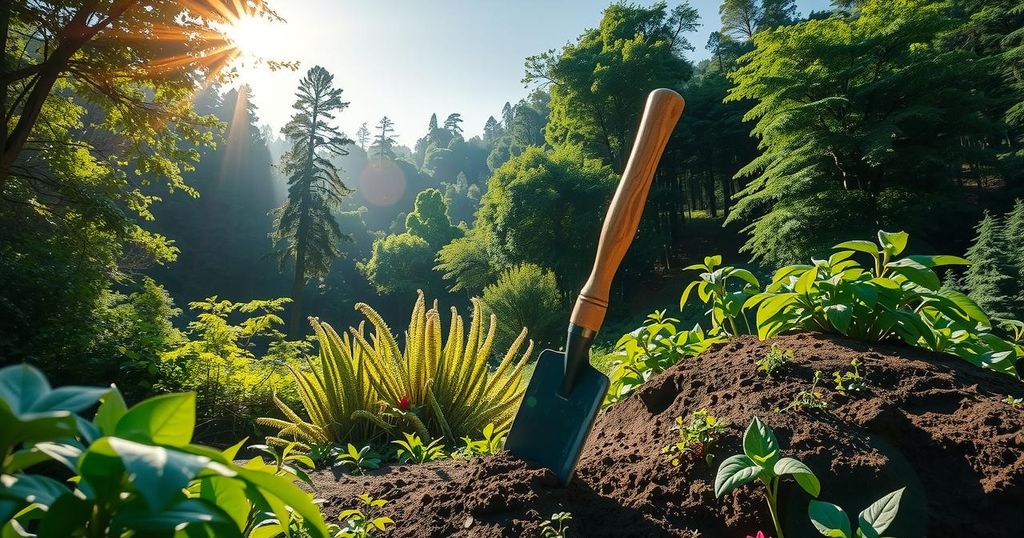The Democratic Republic of Congo’s Okapi Wildlife Reserve faces severe destruction due to Chinese mining operations. Kimia Mining Investment’s activities, bypassing legal protections, threaten biodiversity and local livelihoods. Environmental degradation from mercury usage and significant deforestation exemplifies the devastating impact on the ecosystem and communities dependent on its resources.
In Ituri province of the Democratic Republic of Congo, an alarming environmental crisis is developing as a result of Chinese mining operations, particularly impacting the Okapi Wildlife Reserve, a UNESCO World Heritage site. This area, rich in biodiversity and home to some of the rarest species, is currently facing destruction due to the activities of Kimia Mining Investment, which have ignored international conservation standards and local laws.
The devastation is largely attributed to a controversial adjustment of the reserve’s boundaries that allowed mining operations to encroach upon protected land. Initially, mining was prohibited within the reserve; however, under ambiguous circumstances, boundaries were altered to accommodate Kimia Mining’s exploitation, which contradicts the ICCN’s assertion that original protections should prevail.
Environmental consequences resulting from these mining operations are dire, including significant deforestation and pollution from toxic practices such as mercury use in gold extraction. This not only undermines local ecosystems but also poses public health risks, contaminating water sources and damaging agriculture, which is vital for local communities’ survival.
The Okapi Wildlife Reserve, housing about 15% of the global population of okapi, is now at severe risk as expanding mining activities increase poaching and diminish game availability for local hunters. The reserve, once a sustainable resource for local communities, has transformed into a severely impacted industrial zone.
This scenario is reflective of a larger trend of Chinese exploitation of natural resources in the DRC, highlighted by recent incidents involving illegal mining operations. The egregious cases emphasize the lack of appropriate oversight, further exacerbating the struggles of local populations who have lost their traditional livelihoods due to these intrusions.
Kimia Mining’s operations not only impose economic hardships through high mining fees but also mirror a broader pattern of unfulfilled promises made by Chinese entities, as seen in the unsuccessful Sicomines deal of 2008. This agreement, aimed at infrastructure development in exchange for mining rights, resulted in minimal investment compared to the lucrative extraction of cobalt and copper sites.
The scale of deforestation in the Okapi Wildlife Reserve is alarming; over 480 hectares were lost between January and May alone. The regional loss of forest threatens both ecological diversity and the global climate, given the Congo Basin’s significant role as a carbon sink, which is endangered by continued mining activities.
Despite assertions from Kimia Mining regarding adherence to environmental standards, their dismissive attitude toward ecological concerns reveals a stark priority for mining over preservation. Such a stance is evident in the assertion that Congo “cannot place a higher value on the environment than on mining.”
This article addresses the destructive impact of Chinese mining operations in the Democratic Republic of Congo, specifically within the Okapi Wildlife Reserve. Once a protected area rich in biodiversity, the reserve is facing severe degradation due to unauthorized mining activities, which have been allowed under dubious legal adjustments. The consequences of these actions extend beyond environmental harm, affecting the livelihoods of local communities and highlighting broader patterns of foreign exploitation in African resources.
The ongoing mining activities in the Okapi Wildlife Reserve showcase a frightening disregard for international conservation laws and local welfare. The detrimental impact on both the environment and local communities due to Chinese operations highlights the urgent need for stringent regulatory frameworks and ethical resource management. Immediate action is required to restore protections for this vital ecosystem and support the communities reliant on its preservation.
Original Source: allafrica.com






